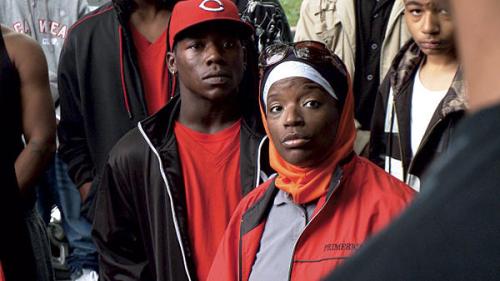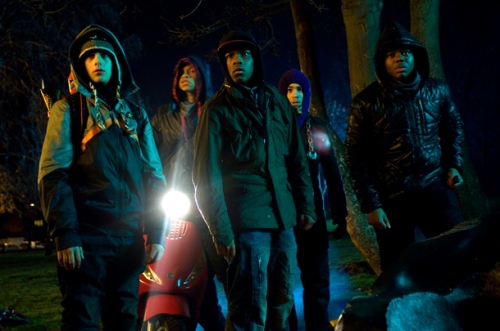95 minutes
This gripping horror-thriller provided one of the most disturbing film-watching experiences I had last year. A tale of two ex-soldiers turned hitmen taking on a job that goes very badly for them both, it turns on an audacious narrative shift that somehow comes with the inevitability of a nightmare. The grim landscape of anonymous chain hotels and suburban housing developments lends a perfectly bizarre incongruity to the increasingly gruesome storyline. Director Wheatley uses jump cuts and eerie soundscapes to keep the audience constantly on edge, lending domestic arguments and scenes of bloody violence the same unsettling atmosphere. Not for the faint-hearted, but still astounding.
114 minutes
In a year full of foul, poisonous rhetoric from our political classes directed towards the disenfranchised, it took a low-budget sci-fi film from comedian-turned-first-time-director Cornish to humanise inner-city youth. The protagonists aren’t whitewashed; they first appear mugging a young woman on her way home. But an alien invasion inspires them to fight back in defence of their block, and the rough-hewn community within. Block is fast-paced, witty and extremely well-crafted for a debut feature. And underneath the action, it poses serious questions about how we live together. It’s a hopeful and humanistic picture, unafraid to wrap big ideas in populist entertainment.

12. Bridesmaids
Dir. Paul Feig (USA, 2011)
125 minutes
Bridesmaids is well worth discussing beyond the cultural conversation it started about women in comedy; it’s a sharp-eyed, extremely funny look at growing up. Kristen Wiig and Maya Rudolph are excellent as the childhood friends whose relationship is tested to destruction over the latter’s impending wedding. Wiig’s Annie is impressively three-dimensional; immature and often unlikeable, she perfectly portrays a young-ish adult unhappy with the turns her life has taken. The supporting cast all put in good work — particularly Chris O’Dowd and the hilarious, scene-stealing Melissa McCarthy — and despite the overlong runtime, it’s an enjoyable ride with people who feel real.

11. 13 Assassins
Dir. Takashi Miike (Japan, 2010)
126 minutes
Master of ultraviolence Takashi Miike here delivers a more toned-down historical samurai picture – which still makes it crazier than most action films out there. The setup — former samurai recruits the titular group of swordsmen to assassinate a sadistic young lord — is a long, slow boil, containing questions of honour, duty and sacrifice. It all leads up to the film’s centrepiece; a delirious 40-minute battle sequence, staged in a booby-trapped village, with the 13 assassins versus a small army. Miike stages the carnage expertly, creating a grippingly visceral sequence that ebbs and flows like a real battle. You stagger out of the cinema privileged at having watched a master at work.

10. Drive
Dir. Nicolas Winding Refn, (USA, 2011)
100 minutes
A stylish throwback to the ‘80s LA-set thrillers of Michael Mann and William Friedkin, Refn’s first US-set film is also of a piece with his previous studies of violent men, shot with a lyricism that belies the brutality they carry with them. Ryan Gosling’s taciturn stuntman/getaway driver isn’t just a Hollywood archetype; he’s a character who’s internalised those those archetypes to show a better face to the world. And although his budding relationship with Carey Mulligan is tenderly believable, it’s only when he’s plunged into the middle of a botched gangland deal that his true nature comes to the fore.
The film benefits from an excellent supporting cast, including the aforementioned Mulligan as a beatific single mother, Bryan Cranston as Gosling’s sad-sack boss, and Albert Brooks and Ron Perlman as a pair of vicious gangsters. But for long stretches Refn chooses to present the film as a near-mute Zen pulp poem, letting the electronica-heavy soundtrack do the talking and concentrating his camera on the architecture of LA, Gosling’s blank expression, the glare of neon or a spurt of rich red blood. It’s a strange fusion of noir and fairytale, with familiar elements retooled and let loose on the road once more.

9. Meeks’ Cutoff
Dir. Kelly Reichardt (USA, 2010)
104 minutes
Though it contains few moments of violence, Meek’s Cutoff is one of the tensest films I saw in 2011. Kelly Reichardt’s low-budget Western takes place among a group of emigrants journeying to Oregon. Travelling by wagon, horse, and on foot, they are constantly vulnerable to the smallest accident marooning them in the parched landscape.
Tensions shimmer like heatwaves between the members of the party, particularly shifty guide Stephen Meek (Bruce Greenwood) and self-assured traveller Emily Thetherow (Michelle Williams). Reichardt’s unobtrusive direction and use of minimal dialogue or music draw us inexorably in to this almost alien world, where the creak of wagon wheels is the only sound. It’s a journey that leads us not towards a traditional climax, but a brief, surreal moment of epiphany.

8. The Interrupters
Dir. Steve James (USA, 2011)
125 minutes
I’ve unfortunately missed out on most of the critically-acclaimed documentaries released in 2011, with one exception. This powerfully affecting story of death and life in inner-city Chicago follows a group called Ceasefire, composed of former gang members, who walk the streets doing what they can to stop the cycle of retaliatory violence spinning out of control. In each nervy conversation with a young person they’re aiming to dissuade from violence, you see the toxic combination of youthful bravado and rage borne of desperation. And as the members themselves tell their stories, you’re left with the sense that each of them feels a furious need to try and relieve future generations of the kind of pain they’ve both caused and suffered.
It’s a film short on moralising and easy answers. The people featured are themselves the story; their self-justifications, reminiscences and struggles to make it through day a reminder of universal human frailty and the capacity for hope.
Dir. Richard Ayoade (UK, 2010)
Comedy genius/music video director Richard Ayoade (you might know him from such Britcoms as The IT Crowd and Darkplace) branches out into feature filmmaking with this coming-of-age tale. Set in a small Welsh seaside town, it follows Oliver Tate, a precocious schoolboy who, like most teenagers, views himself as the heroic protagonist in the film of his life. But strains in his parents’ marriage and the arrival of his first crush threaten to throw his world into confusion.
Ayoade has crafted a brilliant vision here, alternately laugh-out-loud and moving. The distinct look of the film, riffing on Wes Anderson and the French New Wave, is enhanced by the gorgeous retro soundtrack from Alex Turner. Newcomers Craig Roberts and Yasmin Paige are excellent as the star-crossed teenage couple, with the adult supporting cast (Noah Taylor, Sally Hawkins, Paddy Considine) holding up their end. But in the end, this is a film all about youth; how we romanticise ourselves, and the inevitable heartbreak that comes when we have to reconcile that image with the real world.

5. True Grit
Dir. Joel & Ethan Coen (US, 2010)
110 minutes
There are few films that can make me leave the cinema with a sens of aboslute glee. This year, True Grit was one of them. Was it the sense of being in the hands of directors who have absolute mastery of their craft? Was it the excellent performances from Hailee Steinfeld as steely fourteen-year-old Mattie Ross, Jeff Bridges as drunken lawman Rooster Cogburn, and Matt Damon as conceited Texas Ranger LaBoeuf?
Maybe it was that for a Coens film, this is remarkably straight-faced. There are extremely funny lines, thanks to the dry wit of the novel remaining in the script, and moments of off-kilter humour. But as the film takes us to the deserted wilderness beyond American civilisation, it becomes a ripping adventure yarn where the central trio are tested, parted, and then brought back together to help each other.
It’s utterly thrilling to see a directorial team firing on all cylinders, working with excellent actors, bringing a great story to the screen. The perfect climactic action sequence, a non-stop series of impasses and reversals, and the moving coda set years after the main narrative, are a perfect closer to this wonderfully-crafted film.

4. The Skin I Live In
Dir. Pedro Almodóvar (Spain, 2011)
117 minutes

3. Animal Kingdom
Dir. David Michôd (Australia, 2010)
113 minutes
After his mother dies of a heroin overdose, J (James Frecheville) is sent to live with his grandmother (Jacki Weaver), the matriarch of a family of criminals in suburban Melbourne. Caught between his family and the detective pursuing them (Guy Pearce), he must rely on his own wits to stay alive.
The plot, a “relative innocent caught up in criminal underworld struggling to break free” set-up, is well-worn in crime films. Where it differs is in the depiction of murder in the midst of banal Australian suburbia. The operatic tone of a Goodfellas is absent here – these are frightened, desperate men, crashing around cramped under-lit houses. And even Pearce, the nominal “hero”, fights a battle between morals and expediency. The wonderfully foreboding atmosphere makes Animal Kingdom feel like both an excellent crime thriller and examination of a dysfunctional family, looking at the lies we tell our relatives and ourselves.

2. Take Shelter
Dir. Jeff Nichols (USA, 2011)
120 minutes
I’d heard the praise for Jeff Nichols’ latest film long before it arrived in my neck of the woods. But I was still unprepared for how it affected me. This is an unbearably tense film, with scenes scarier than most horror films. And the most terrifying thing about it is that all the threat comes from inside the protagonist.

1. The Tree Of Life
Dir. Terrence Malick (USA, 2011)
139 minutes
A young boy in small-town 50s Texas. A grown man, ill at ease among towers of steel and glass. The beginning of the universe, the making of the world, and the struggle of life in all its forms. Malick weaves these threads into a tapestry that contains all the questions on life, nature and spirituality that he’s been asking over his entire career.And it’s remarkable how subtly these themes are integrated into the DNA of the film. The constantly roving cinematography, taking the POV of a silent observer flitting in and out of rooms and wandering along bucloic country roads, is the viewpoint of an endlessly curious child. When the scenes switch to a detached, almost Kubrickian exploration of the early universe and primodial life on Earth, we carry that sense of childlike wonder with us. Every instance of creation — the birth of Brad Pitt and Jessica Chastain’s children, the musical signatures tapped out on the piano, the massive arrays of machinery that Pitt works with — echoes that primal moment when something was born from nothing.
While the film is a distillation of Malick’s favourite themes – man vs nature, sin and grace, how a child sees the world – it also feels like an expansion of his vision, an attempt to do something even more impressionistic and abstract. It might not have worked for some, but I was riveted. I assume there will be more to discover on further rewatchings, but one showing was enough to make a deep impression on me. It’s what film should be about.






